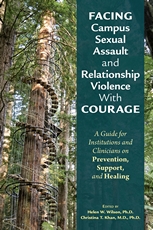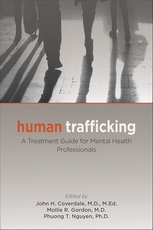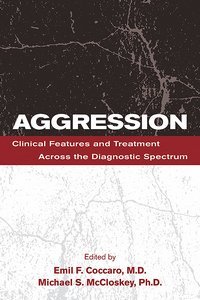Textbook of Violence Assessment and Management
View Pricing
Description
Evaluating and treating patients with violent ideations and behaviors can be frustrating, anxiety-provoking, and even dangerous, as errors in judgment can lead to disastrous consequences. Fortunately, there is the Textbook of Violence Assessment and Management, the first and only comprehensive textbook on assessing the potentially violent patient for mental health clinicians on the front lines of patient care.
Uniquely qualified to produce this comprehensive volume, the editors have assembled a distinguished roster of contributors who, in 28 practical chapters, combine evidence-based medicine with expert opinion to address the topic of patient violence in all its diversity of presentation and expression. Dr. Simon is Director of the Program in Psychiatry and Law at Georgetown University School of Medicine, as well as the author or co-author of more than two dozen books. Dr. Tardiff, Professor of Psychiatry and Public Health at the Payne Whitney Clinic, The New York Hospital—Cornell Medical Center, is the author of The Concise Guide to Assessment and Management of Violent Patients, an introduction to aggression management now in its second edition.
Violence is both endemic to our society and epidemic in our age. Skilled assessment and management of violence is therefore critical for mental health professionals involved in patient care. The Textbook of Violence Assessment and Management includes many features designed to instruct and support these clinicians. For example:
- It is the first comprehensive textbook to take the mental health professional from evaluation and assessment to treatment and management of patients who are or may become violent.
- The 28 chapters address the diversity of clinical settings, patient demographics, psychopathology and treatment modalities, making this work useful as both a textbook and a reference that clinicians can consult as needed for particular cases.
- End-of-chapter Key Points highlight the most important concepts and conclusions, allowing students to review and consolidate their learning and practicing professionals to locate critical information quickly.
- Clinical case examples abound, providing rich and nuanced perspectives on patient behavior, evaluation and management.
- The textbook includes a separate chapter on evaluating patients from different cultures, a competency that becomes more crucial as patient populations become more diverse.
Increasing numbers of veterans are diagnosed with PTSD and traumatic brain injury. Campus tragedies such as Virginia Tech are fresh in our collective memory. This text is both timely and necessary—not just for mental health professionals and their patients, but for the families and communities whose safety depends upon competent professional judgment.
Contents
- Contributors
- Foreword
- Preface
- Acknowledgments
- Part I: ASSESSMENT PRINCIPLES
- Chapter 1. Clinical Risk Assessment of Violence
- Chapter 2. Structured Risk Assessment of Violence
- Chapter 3. Cultural Competence in Violence Risk Assessment
- Chapter 4. Psychological Testing in Violence Risk Assessment
- Part II: MENTAL DISORDERS AND CONDITIONS
- Chapter 5. Mood Disorders
- Chapter 6. Schizophrenia and Delusional Disorder
- Chapter 7. Posttraumatic Stress Disorder
- Chapter 8. Substance Abuse Disorders
- Chapter 9. Personality Disorders
- Chapter 10. Neurological and Medical Disorders
- Chapter 11. Impulsivity and Aggression
- Part III: TREATMENT SETTINGS
- Chapter 12. Outpatient Settings
- Chapter 13. Inpatient Settings
- Chapter 14. Emergency Services
- Part IV: TREATMENT AND MANAGEMENT
- Chapter 15. Psychopharmacology and Electroconvulsive Therapy
- Chapter 16. Psychotherapeutic Interventions
- Chapter 17. Seclusion and Restraint
- Part V: SPECIAL POPULATIONS
- Chapter 18. Children and Adolescents
- Chapter 19. The Elderly
- Part VI: SPECIAL TOPICS
- Chapter 20. Forensic Issues
- Chapter 21. Legal Issues of Prediction, Protection, and Expertise
- Chapter 22. Sexual Violence and the Clinician
- Chapter 23. Violence Toward Mental Health Professionals
- Chapter 24. Intimate Partner Violence and the Clinician
- Chapter 25. Workplace Violence and the Clinician
- Chapter 26. Vehicular Crashes and the Role of Mental Health Clinicians
- Chapter 27. School Violence
- Chapter 28. Clinically-Based Risk Management of Potentially Violent Patients
- Index
Contributors
- Sara E. Allison, M.D.
Peter Ash, M.D.
Ross J. Baldessarini, M.D.
Bruce Bongar, Ph.D., ABPP, FAPM
Margaret Brewer, R.N., M.B.A.
Beth S. Brodsky, Ph.D.
Frank R. Campbell, Ph.D., L.C.S.W., C.T.
Juan Jose Carballo, M.D.
Cameron S. Carter, M.D.
John A. Chiles, M.D.
Yeates Conwell, M.D.
Jan Fawcett, M.D.
Laura J. Fochtmann, M.D.
Glen O. Gabbard, M.D.
Michael Gitlin, M.D.
Liza H. Gold, M.D.
Robert E. Hales, M.D., M.B.A
Lindsay M. Hayes, M.S.
Marnin J. Heisel, Ph.D.
Donald M. Hilty, M.D.
Eric Hollander, M.D.
Leslie Horton, M.D., Ph.D.
Douglas G. Jacobs, M.D.
H. Florence Kim, M.D.
Martin Leamon, M.D.
Hallie A. Lightdale, M.D.
Avram H. Mack, M.D.
Carl P. Malmquist, M.D., M.S.
John T. Maltsberger, M.D.
Lauren B. Marangell, M.D.
Daryl Matthews, M.D., Ph.D.
Herbert Meltzer, M.D.
Jeffrey L. Metzner, M.D.
Donald J. Meyer, M.D.
Maria A. Oquendo, M.D.
Cynthia R. Pfeffer, M.D.
Maurizio Pompili, M.D.
Phillip J. Resnick, M.D.
Charles L. Scott, M.D.
Daniel W. Shuman, J.D.
Daphne Simeon, M.D.
Robert I. Simon, M.D.
Gregory Sokolov, M.D.
Barbara Stanley, Ph.D.
Kirk D. Strosahl, Ph.D.
Glenn R. Sullivan, Ph.D.
Leonardo Tondo, M.D.
Sheila Wendler, M.D.
Jong H. Yoon, M.D.
Stuart C. Yudofsky, M.D.
About the Authors
Robert I. Simon, M.D., is Clinical Professor of Psychiatry and Director, Program in Psychiatry and Law, at Georgetown University School of Medicine in Washington, DC. He has been a practicing psychiatrist and forensic psychiatrist for over 40 years. Dr. Simon has authored or edited 25 other books for psychiatrists and other mental health professionals on topics in psychiatry and the law. He has also published numerous papers on civil and criminal matters, including a study of 33 murderers.
Kenneth Tardiff, M.D., M.P.H., is Professor of Psychiatry and Public Health at Weill Medical College of Cornell University, and Attending Psychiatrist at New York-Presbyterian Hospital/Weill Cornell Medical Center in New York, New York.
Related Products
Carousel Control - items will scroll by tabbing through them, otherwise arrows can be used to scroll one item at a time








